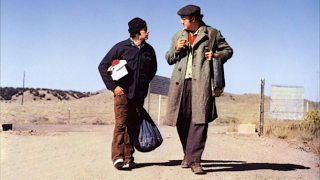 Despite its dynamite star pairing, Scarecrow (1973) has been lost in the shuffle of '70s road movies. Gene Hackman and Al Pacino enrich an aimless drama, more impressive in moments than as a whole.
Despite its dynamite star pairing, Scarecrow (1973) has been lost in the shuffle of '70s road movies. Gene Hackman and Al Pacino enrich an aimless drama, more impressive in moments than as a whole.Two vagrants meet on the road in California. Max Millian (Gene Hackman) is a coarse ex-criminal, Lion Delbuchi (Al Pacino) a simpleminded ex-sailor. They join together, traveling first to Denver to meet Max's sister Darlene (Eileen Brennan), then to Detroit, where Lion's ex-wife (Penelope Allen) lives. They bond while getting into scraps, including a traumatic visit to a prison work farm, and dream of starting a carwash in Pittsburgh. Naturally, reality doesn't match their expectations.
Scarecrow is a long, episodic ramble across rural America. Director Jerry Schatzberg and writer Garry Michael White lean heavily on Of Mice and Men, with Max a fast-talking tough guy and Lion an innocent simpleton. Their relationship develops in familiar fashion, with Lion restraining Max's violent tendencies and Lion receiving harsh lessons in reality. Specific episodes aren't always predictable, but the overall film conforms to rote archetypes.
Nonetheless, Scarecrow gets mileage from its character interactions. Both protagonists alternately seek and shirk settled life. Max enjoys a long interlude with Darlene and a girlfriend that reminds him of his squalid background, steeling his resolve to visit Pittsburgh. Lion totes a gift for his son, but can't restore his life. His innocence shields him from adult responsibilities, unable to handle rejection. Their dream's far more alluring than reality, which disappoints them at every turn.
Schatzberg trades The Panic in Needle Park's urban cityscapes for Vilmos Zsigmond's gorgeous widescreen photography. Key scenes develop in long takes and wide shots, especially Max's confrontation with a bullying criminal (Richard Lynch), while Fred Myrow offers a minimalist, homey score. Varied set pieces range from amusing (Max's comic striptease) to horrifying (Lion's prison rape), though Lion's climactic breakdown is as affecting as it should be.
Gene Hackman plays to his strengths as a tough man undercut by insecurity. Al Pacino, having just hit stardom with The Godfather, works effectively against type, Lion's naivety coarsened by his gradually unspooling mental state. Supporting players register in moments: Richard Lynch's ingratiating villain, Eileen Brennan's weary sister, Penelope Allen's exasperated wife.
Perhaps Scarecrow isn't a classic because of its unfocused nature; like many road trips it jumps from scene to scene with little common thread beyond its characters. This makes the dramatic road logy and the ending a tragedic squib. Still, there's something to be said for any film with such phenomenal casting.

